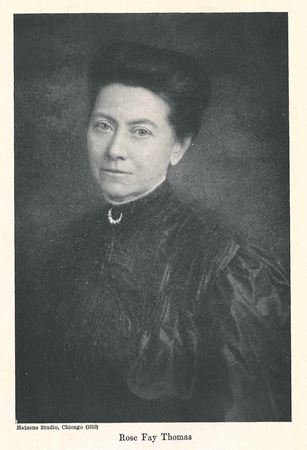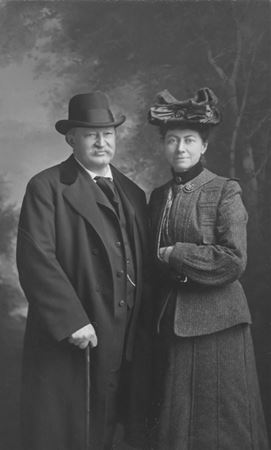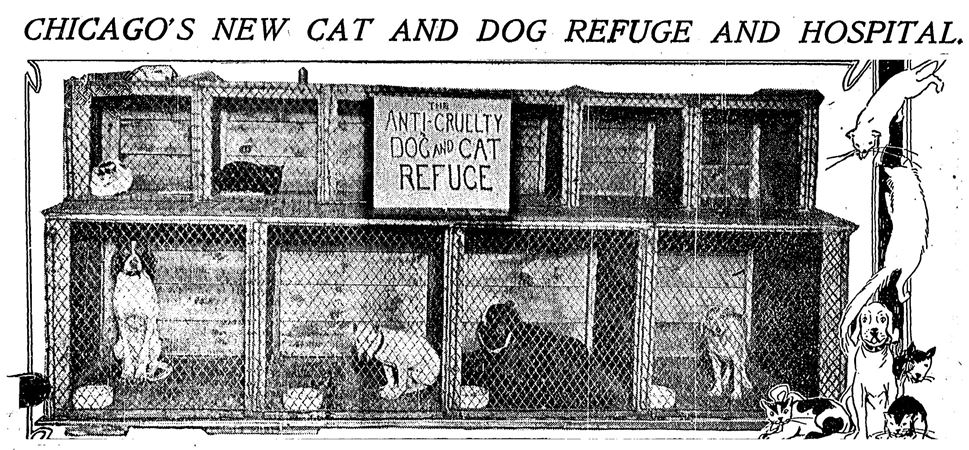Rose Fay Thomas and Dickey, the Thomas family’s Springer Spaniel, in the late 1890s
George Glessner (courtesy of Glessner House)
Wishing our friends at The Anti-Cruelty Society a very happy 125th anniversary! And a tip of the hat to the society’s first president, Rose Fay Thomas, wife of Theodore Thomas, founder and first music director of the Chicago Symphony Orchestra!
During Chicago’s World’s Columbian Exposition in 1893, nearly 28 million people visited our fair city, to “marvel at man’s progress and visions for the future,” according to the society. “Yet the utopian ephemeral White City was a sharp contrast to the poorer neighborhoods that lay a short distance from the fairgrounds. The United States was in the midst of an economic depression. Hoards of immigrants, spurred by the industrial revolution, flocked to Chicago and other urban centers in search of work only to find themselves poor, starving, and huddled in crowded tenements. Raw sewage ran through the streets and epidemics of typhoid and other diseases often ravaged the city. The social unrest that would lead to the deadly Pullman Strike in 1894 was on the rise.
“As the century drew to a close, this grim climate and a deepening fear of these growing urban masses lead to the rise of progressive social reforms in Chicago and other urban centers. The middle and upper class women of the day were the driving force of this movement. Since the rise of the Suffrage movement in the 1850s, many women had become increasingly dissatisfied with their designated place in society and wished to play a more active role in bringing about needed change. In Chicago, many such women took the lead in establishing ground breaking social institutions and reforms. Jane Addams opened Hull House in 1889 to provide social services to immigrants and the working poor. Chicago’s women’s clubs formed charitable organizations and reform committees in response to the needs of the city’s poor, neglected and abused. In 1899 a small group of Chicago women turned their attention to a forgotten group of suffering creatures — the city’s animal population.



“These humanitarians faced an uphill struggle to overcome the hardship, neglect, and cruelty all around them. A large percentage of the city’s estimated 50,000 workhorses were old, sick, and ill cared for. Many dropped under heavy burdens, only to be savagely beaten by insensitive drivers. The burgeoning Union Stock Yards and the slaughterhouses demonstrated little concern for the livestock they handled and incidents of inhumane butchery practices were common. Homeless dogs and cats wove their way through crowds of people in the streets in search of morsels of food and temporary shelter.
“A deep concern for the welfare of these helpless creatures led five Chicagoans to the home of Mrs. Theodore Thomas, wife of the city’s symphony conductor, on the evening of January 19, 1899. A second larger meeting at the residence of Mrs. Joseph Winterbothom on March 7, 1899, led to the formation of The Anti-Cruelty Society. This meeting saw the adoption of by-laws and election of Mrs. Thomas as the group’s first president. As the president of The Anti-Cruelty Society, Mrs. Thomas became one of the first women to head a humane society.
“This small band of dedicated volunteers set high goals: to suppress cruelty to animals, to educate the public on humane treatment, and to create a refuge for strays. The Anti-Cruelty Society opened its first small animal shelter in 1904 at 1898 North Clark Street. By 1905, it had placed watering troughs throughout Chicago for thirsty workhorses. On December 6, 1906, The Anti-Cruelty Society received a charter from the State of Illinois to conduct protective work with animals and children. In addition to its work with animals, the Society was directly involved in the handling of child welfare cases for the next decade. The Society also instituted a humane education campaign organizing children’s chapters, distributing humane literature, and providing lectures.”
The Anti-Cruelty Society — one of Chicago’s oldest animal welfare organizations — continues its mission today, “building a community of caring by helping pets and educating people.”
Happy, happy anniversary!
This article also appears here.



